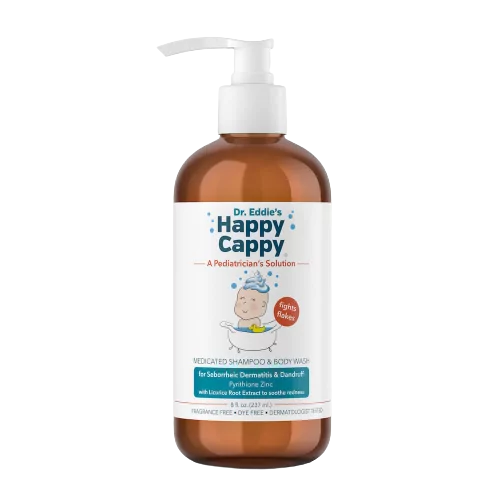
Your skin is an organ; like any organ, it can become irritated by repeated exposure to stressors. When your stomach is irritated, you get indigestion. When your lungs are irritated, you cough. When pollen is in full bloom in the springtime, you get itchy, watery eyes and nose. You get the picture…
With irritated skin, you may see redness, swelling, dryness, flaking, blotches, or blisters. If you are experiencing irritated skin, try not to stress too much. We know this may be cold comfort, but with a few simple tips and the right skincare products, you can effectively calm that irritation.
Read this blog to discover what might be causing that skin irritation and how to soothe the largest organ of your body–skin.
What is Irritated Skin?
At some point in your life, you may have experienced a rash or a change in your skin’s texture that caused itching, scales, small bumps, rawness, or a burning sensation. This was likely because your skin was irritated.
The topmost layer of our skin works as a protective barrier against outdoor allergens and irritants. But oftentimes when this barrier is not working properly, our immune system triggers a response to protect the body which results in the surface becoming irritated.
People with prolonged skin irritation are more likely to experience increased oil production, enlarged pores, brown spots, wrinkles, and skin aging.
What Does Irritated Skin Look Like?
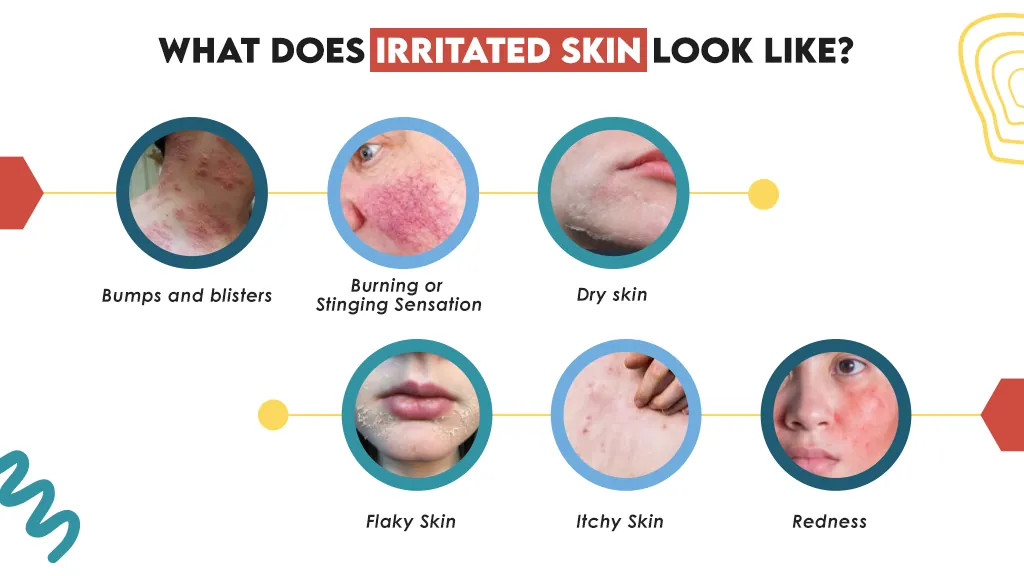
If you are wondering what irritated skin might look like, then you have come to the right place. In some instances, you can get irritation without any visible signs of redness, blisters, or dry skin, while at other times you might experience almost all of these findings.
Skin irritation can appear anywhere on the body. However, there are certain parts of the body that are more sensitive than others, such as the face, around the eyes, skin folds, and hands. Some visible symptoms are.
- Bumps and blisters
- Burning or stinging sensation
- Dry skin
- Flaky skin
- Itchy skin
- Redness
The redness may appear as rashes on the skin, which can be pink or red in color in people with lighter skin tones and purple, grey, or brownish in darker skin tones. The severity of the symptoms may vary depending on the root cause of the irritation.
What Causes Irritated Skin?
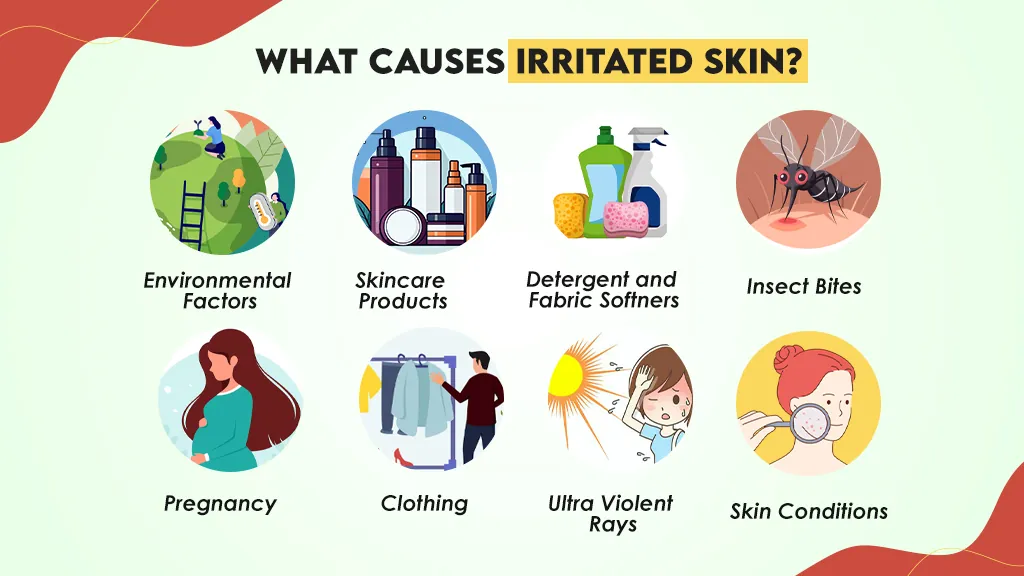
The main cause of your skin getting irritated is it reacting towards a certain irritant or allergen. This scenario is often classified as Contact dermatitis. When the skin’s protective barrier is not working properly, it is unable to protect against outside irritants and retain moisture properly which ultimately leads to various skin conditions.
There are various factors that work as triggers. From environmental factors to medical conditions, anything can result in irritation. It is difficult to mention all of the potential factors, which is why we listed some of the most common ones.
Environmental Factors
Environmental factors are the most common cause of irritated skin. These are also the culprits for irritant contact dermatitis.
- Pollen
- Metals
- Pet dander
- Air pollution
- Molds
- Dust mites
- Smoke
- Poison ivy
These are the factors that can trigger irritation once the skin comes in contact with them.
Skincare Products
The second most common reason for irritation on the skin is the products that we use in our daily lives. Products like cleaners, soaps, lotions, and makeup contain harsh chemicals that can irritate the skin very easily.
These chemicals strip away moisture from the skin and disrupt the natural skin barrier leading to issues like itchy skin, irritation, redness, and rashes.
Detergent and Fabric Softeners
This is something that very few people think of as irritants. But the truth is, chemicals in detergents and fabric softeners can be dangerous to the skin.
The chemicals in these products are added to remove dirt and stains from clothes but most of the time, these chemicals can also irritate your skin either from touching these products or when used on clothes.
To avoid getting skin irritation from these products, choose hypoallergenic detergent and fabric softeners containing fewer irritating chemicals.
Insect Bites
There is likely no one on this planet that has not experienced itching and irritation from insect or bug bites. People who live near a forest or in damp, humid areas are more likely to experience bug bites.
People with hypersensitive skin may even experience irritation just by an insect or bug passing near them. To avoid bug bites, make sure to cover your skin as much as possible before you go out, or use an insect repellent to keep the bugs away. We advise DEET as the best ingredient to repel insects.
Pregnancy
This is a lesser-known cause of irritated skin, but the hormonal changes in the body during pregnancy can cause the skin to lose moisture more easily and make it more sensitive than usual. The most common pregnancy-associated conditions that cause itching and irritation are cholestasis of pregnancy, also known as obstetric cholestasis, and polymorphic eruption.
It is essential to keep your skin as moisturized as possible during your pregnancy to prevent skin from getting dry and irritated.
Clothing
The clothes we wear can irritate our skin. Even normal skin gets irritated from wearing tight clothing and clothes made from harsh materials like synthetic fiber and wool. People who have sensitive skin need to be even more careful while choosing clothes to wear because even the tags and loose threads can cause irritation and rashes on skin.
To prevent your skin from getting irritated by clothes, always wear loose clothes made with light, breathable material.
Ultraviolet Rays
The harmful rays emitted from the sun, especially during the peak hours around noon, can cause irritation on your skin. UV rays can strip away moisture from the skin and even cause damage to your skin’s natural barrier or the epidermis.
The effects of these rays can even promote skin infections and skin cancer. It is important to apply sunscreen before going out to protect your skin from those harmful UV rays. Consult your dermatologist if you have sensitive skin to find the best sunscreen for your skin type. Also try covering your skin as much as possible with clothes, hats, and umbrellas if you’re planning to be outside in the sun for a while.
Skin Conditions
Aside from the factors mentioned above, certain medical and skin conditions can also cause itching and irritation on the skin.
- Eczema
- Psoriasis
- Seborrheic Dermatitis (Cradle Cap)
- Hives
- Dry Skin
- Heat Rash
- Rosacea
- Diabetes
- Acne
- Cellulitis
The best way to get rid of irritation caused by these conditions is to treat the underlying issue.
Irritated Skin in Babies
That soft, marshmallowy, smooth skin on those chubby cheeks in babies is something no one can resist loving. But did you know that baby-soft skin is very delicate and can be easily irritated by almost anything?
When babies are in the womb, their skin is covered with amniotic fluid that works as a protective barrier. But when they come into this world the protective layer is removed. Their skin is still thin and developing, making it more prone to sensitivity and irritation.
This is why babies often experience heat rash (miliaria), diaper rash, drool rash, and eczema.
There are various factors that can trigger irritation on the baby’s skin. Some of the most common ones are
- Extreme weather conditions
- Harsh chemicals in products
- Friction
- Allergies
- Leaving the skin damp
- Dust mites
- Drool
To learn more about what might be causing rashes on your baby’s skin, read this blog. Even though irritated skin in babies is very common, it can easily be managed at home.
- The first thing you need to do is rule out what might be causing the irritation. Then try keeping your baby away from that irritant.
- Avoid using any product (cosmetic like shampoo or soap, detergent, fabric softner, etc.) that contains fragrance, paraben, or sulfate on your baby’s skin.
- Bath them two or three times a week at a minimum with gentle baby shampoo and body wash.
- Make sure to keep their skin moisturized at all times with a fragrance-free baby moisturizing cream.
Irritated Skin Around Eyes
The skin around the eyes is delicate and sensitive and can easily become irritated. Even a little rubbing can lead to redness and a burning sensation. Itching and irritation around the eyes is often due to dermatitis or eyelid dermatitis.
Some other factors that lead to irritation are:
- Allergy
- Skincare products
- Less sleep
- Intense rubbing
- Pollution
- Sun’s UV rays
The redness and rashes around the eyes may look bothersome. But don’t worry. They can be managed with proper care.
- Avoid using any harsh products around your eyes
- Keep the skin moisturized.
- Use lukewarm or cool water to wash your face.
- Use a cold compress to keep the skin cool.
- Use a sunscreen.
- Don’t rub your eyes vigorously.
These are a few tips that you can incorporate into your daily routine and prevent skin irritation around the eyes. Remember, gentle is the operative word when it comes to happy eyes and skin.
Irritated Skin VS Sensitive Skin
Most of us likely think of irritated skin and sensitive skin as being the same. They pretty much look the same and cause similar symptoms, but in reality, they are two separate conditions. When you experience one of them, you will likely get the other one as well.
They are like two best friends that follow each other everywhere. However, a research paper by the National Library of Medicine highlights how both conditions are different. Sensitive skin is the reaction of our skin working as a sensory organ. Skin sensitivity is the natural reaction of one’s skin towards any factor or stimuli, while irritated skin is how the skin will react after coming in contact with a certain product or factor.
How To Soothe Irritated Skin?
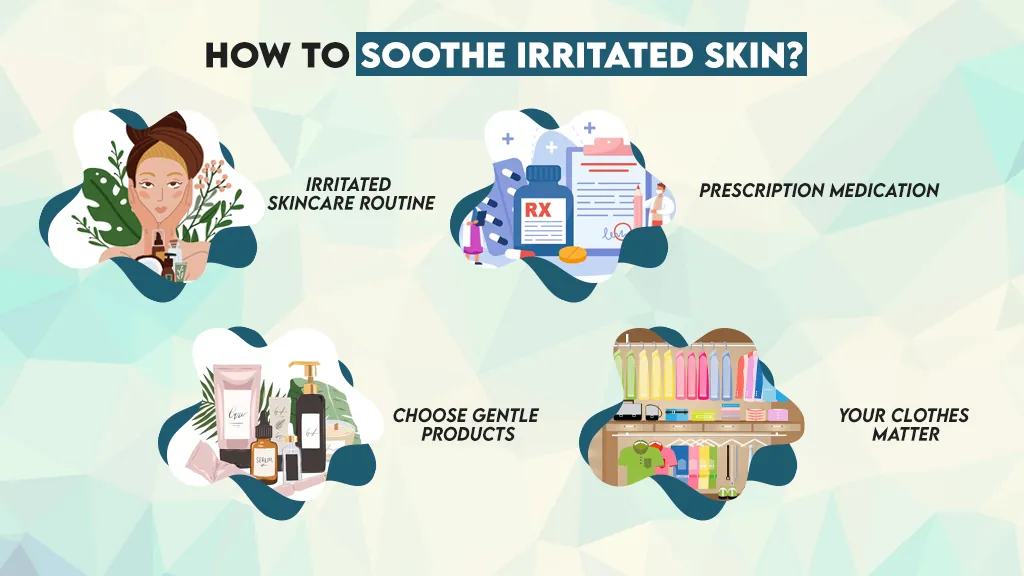
Now let’s discuss how to soothe that irritated skin of yours. We know it’s easier said than done, but all you have to do is avoid the triggers and follow a gentle skincare routine, and you are good to go.
Irritated Skincare Routine
Following a proper skincare routine can not only help you soothe your skin irritation but can also keep other common skin problems like dry skin, acne, premature skin aging, and atopic dermatitis at bay. Whether you are experiencing any skin issues or not, you should always follow this routine to have smooth and healthy skin.
Use a Gentle Cleanser
The first step in your routine must include the use of a gentle cleanser, face wash, or body wash to keep the skin clean. Deep skin cleaning will help remove dirt, oil, and dead skin cells from the skin pores and allow for the moisturizer to do its job.
- Cleanse your skin thoroughly at least twice daily.
- Wash your face and exposed skin whenever you come from outside to remove any pollutants or irritants.
- While washing, gently massage your skin to remove the debris from pores.
- After washing, pat dry your skin.
- The scalp is also part of your skin, so make sure to clean it with a daily shampoo at least three times a week.
Hydrate Your Skin
The second step in your routine should be moisturizing. Keep your skin moisturized with a hypoallergenic moisturizing cream or lotion as much as possible, especially after cleaning or washing your skin.
Moisturizing is a must for people who are experiencing irritated skin because it is often caused by an impaired skin barrier. Moisturizing can help hydrate the skin and act as a natural barrier.
- Moisturize your skin at least twice daily, once before going to bed.
- Apply a moisturizer on your skin within 3 minutes after taking the bath.
- Use a moisturizer that is free from any harsh chemicals that may further irritate your skin.
Soothing the Skin
Irritation often leads to itching and dryness. In severe cases, the itching can be irritating and disrupt your sleep. If you are one of those who wakes up at night due to itching, then try using wet wrap therapy.
Wet wrap therapy is typically advised for eczema patients with severe itching and irritation during an eczema flare-up. In this therapy, a thick emollient is applied to the skin. It is then covered with a wet gauze, and last wrapped with a dry cloth or gauze.
It is left overnight to soothe the itching and redness and to hydrate the skin all night long.
Prescription Medication
If your condition is not improving by avoiding the trigger and taking proper care of the skin or the condition is worsening, then it is best to consult a dermatologist. For severe skin irritation, they may prescribe the use of certain medications.
Hydrocortisone cream: 1% hydrocortisone cream is easily available as an OTC medication and is mostly used to soothe rashes, irritation, and redness.
Steroids: mild steroids are prescribed to relieve symptoms of contact dermatitis, irritation, and eczema.
Antihistamines: these are used to treat and soothe severe itching. The antihistamines block the effects of histamines in the body to relieve itching.
Antifungals: these are creams and ointments prescribed usually when the irritation is because of fungus or Malassezia yeast.
Choose Gentle Products
The most common cause of irritation on the skin is the chemicals in the skincare products we use. This makes it crucial that you choose the right products, especially if you have sensitive skin or are experiencing any skin issues.
Choose face wash, moisturizer, serums, and creams that are fragrance-free. The fragrance tends to strip away natural oils from the skin, leaving it dry and irritated. Some other chemicals that can irritate even normal skin and should be avoided at all costs are:
- Phthalates
- Paraben
- Sulfates
- Hydroquinone
- Diethanolamine
- Artificial colorants
Before buying your skincare products, take a look at their ingredients section, and if any of these chemicals are present, don’t buy them.
Your Clothes Matter
Choosing and wearing the right clothes can improve your symptoms. Often skin can get irritated by fabrics like wool and synthetic fibers. If you suspect that you started experiencing red, irritated skin due to wearing certain clothes, then avoid them.
- Avoid wearing tight clothes, instead opt for loose fitting ones.
- Wear clothes made from breathable clothes like cotton and linen.
- Wear cotton socks instead of synthetic ones to avoid sweating.
- If tags and labels on the clothes are irritating your skin, cut them off.
- Use a mild detergent that is free from fragrances to wash your clothes.
- Avoid using fabric softeners with harsh chemicals.
Making a few lifestyle changes can help you go a long way and promote healthy skin.
Do’s and Don’ts for Irritated Skin
| Do’s | Don’ts |
| Keep your skin moisturized | Scrub your skin vigorously |
| Use lukewarm or cool water to wash the skin. | Use products with skin irritants |
| 5-minute baths daily | Take a long hot shower or bath |
| Avoid skin irritants as much as possible | Use harsh soaps and exfoliators on your skin |
| Use sunscreen while going outside | Scratch your skin |
| Cover your skin as much as possible before going out | Rub your skin to dry it |
| Wear loose, breathable clothes | Use any prescription medication without the doctor’s consent. |
Irritated Skin Cream
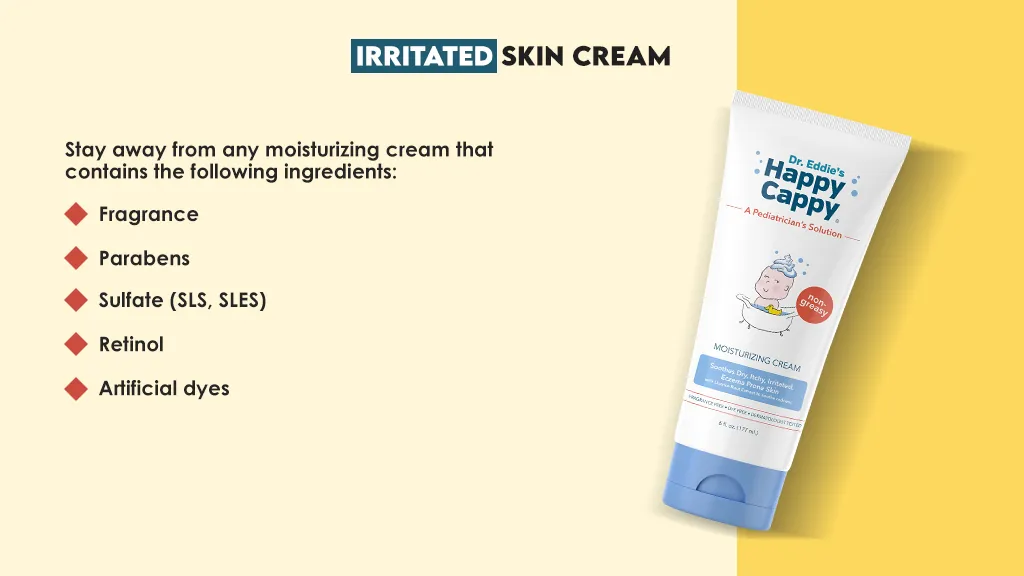
Now that you know how important it is to keep your skin hydrated at all times, you must be wondering which is the best moisturizing cream for irritated skin. We have got your answer.
Stay away from any moisturizing cream that contains the following ingredients:
- Fragrance
- Parabens
- Sulfate (SLS, SLES)
- Retinol
- Artificial dyes
Look for a moisturizer in the form of a cream or ointment. We know that for some people, when they think about ointment or cream, the sensation of greasy and sticky immediately comes to mind. So why use them? Believe it or not, there are a few moisturizing creams available in the market that are NOT greasy and are fast-absorbing while NOT feeling sticky.
Creams can keep your skin hydrated for a longer period of time than lotions. Dr. Eddie has a specially formulated moisturizing cream for sensitive, dry, itchy, and irritated skin that is not at all greasy.
It is infused with natural ingredients like licorice root extract that soothes itching and irritation and glycerin to help restore the natural skin barrier, and utilizes the highest quality snow white petrolatum to keep it hydrated all day long.
When To Contact a Dermatologist?

Irritated skin can be managed at home by applying some TLC (tender love and care) to your skin. However, if you notice that your irritation is getting worse or is not getting better with time, it is best to contact a dermatologist.
If you are experiencing any of the following symptoms along with irritation, immediately consult your healthcare provider:
- Swollen throat
- Difficulty in breathing
- Fever
- Joint pains
- Signs of infection
Most of the time, irritation is just your skin’s natural reaction towards irritants, and it can be managed at home. But in some cases, irritation can be the sign of an underlying condition, which will only get better once properly addressed by a physician.
Do some of your own sleuthing, but don’t delay in contacting a dermatologist or healthcare provider so they can quickly do the heavy lifting in the detective arena so there is no delay in diagnosis.
Key Takeaways
- Irritated skin can cause itching, dryness, redness, and blisters on the skin.
- It is the result of an impaired skin barrier. The skin becomes irritated after coming in contact with irritants or allergens.
- There are various factors that can trigger irritation, such as weather, skincare products, sun rays, and pollen.
- There are certain medical and skin conditions like eczema, contact dermatitis, and psoriasis that can also cause irritation.
- Skin irritation can be soothed by avoiding triggers, and keeping the skin clean and moisturized at all times.
Call in the Happy Cappy
As you have read, irritated skin is often caused by cleansers and skincare products that contain harsh chemicals and preservatives. If that’s your situation, choose Happy Cappy products instead.
They’re formulated to be mild yet effective. Most importantly, they omit dyes, fragrances, and other damaging ingredients that can irritate your skin. Happy Cappy products are just what your red, irritated skin needs. Pick some up today!
FAQs
How to calm irritated skin?
You can soothe and calm irritated skin by using a cold compress and moisturizing it. Use a skin cleanser with ingredients like oatmeal extract and licorice root extract and follow it up with a moisturizer that contains glycerin and licorice root extract to help soothe the irritation.
What chemicals cause skin irritation?
Certain chemicals can easily irritate your skin. This is why people working in factories often experience a higher rate of dermatitis. Some common chemicals that you should avoid to prevent irritation are:
Fragrances
Ammonium hydroxide
Phenol
Sodium hypochlorite
Hydrochloric acid
Petroleum solvents (for example mineral spirits, lacquer thinner, acetone)
These chemicals are often present in detergents, bleach, drain cleaners, disinfectants, and painting supplies.
What not to do when your skin is irritated?
If you are already experiencing rashes, redness, or irritation, then
Avoid using any makeup on the affected area.
Don’t rub your skin
Avoid exfoliating.
Don't scratch.
Don't use hot water to wash it.
How do you soothe irritated skin on face?
The best way to soothe irritated facial skin is by moisturizing it. The skin on the face is susceptible and delicate and can be easily irritated.
Natural remedies like aloe vera, oatmeal, and green tea are known to soothe skin, but everyone’s skin is different and may react differently. So, be careful using any natural remedies on your face without the speaking to a dermatologist first.
Cold temperatures can help reduce itching and irritation by numbing your sensory cells. Using a cold compress can also soothe irritation, but it will only be temporary.
Can skin irritation go away on its own?
Skin irritation can sometimes disappear on its own once the skin is away from the irritant. This usually happens in mild cases of irritation, but if you experience severe irritation and rashes, then you may need to consult a doctor.
Is Vaseline good for skin irritation?
Vaseline (100% petroleum jelly) can help lock in moisture on the skin. If using it, apply immediately after taking a bath or shower.







